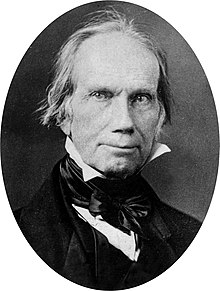Henry Clay
| Henry Clay Sr. | |
|---|---|
 |
|
|
United States Senator from Kentucky |
|
|
In office March 4, 1849 – June 29, 1852 |
|
| Preceded by | Thomas Metcalfe |
| Succeeded by | David Meriwether |
|
In office November 10, 1831 – March 31, 1842 |
|
| Preceded by | John Rowan |
| Succeeded by | John J. Crittenden |
|
In office January 4, 1810 – March 4, 1811 |
|
| Preceded by | Buckner Thruston |
| Succeeded by | George M. Bibb |
|
In office December 29, 1806 – March 4, 1807 |
|
| Preceded by | John Adair |
| Succeeded by | John Pope |
| 9th United States Secretary of State | |
|
In office March 4, 1825 – March 4, 1829 |
|
| President | John Quincy Adams |
| Preceded by | John Quincy Adams |
| Succeeded by | Martin Van Buren |
| 7th Speaker of the United States House of Representatives | |
|
In office March 4, 1823 – March 4, 1825 |
|
| President | James Monroe |
| Preceded by | Philip P. Barbour |
| Succeeded by | John W. Taylor |
|
In office March 4, 1815 – October 28, 1820 |
|
| President | James Madison James Monroe |
| Preceded by | Langdon Cheves |
| Succeeded by | John W. Taylor |
|
In office March 4, 1811 – January 19, 1814 |
|
| President | James Madison |
| Preceded by | Joseph B. Varnum |
| Succeeded by | Langdon Cheves |
| Member of the U.S. House of Representatives from Kentucky |
|
|
In office March 4, 1823 – March 4, 1825 |
|
| Preceded by | John T. Johnson |
| Succeeded by | James Clark |
| Constituency | 3rd district |
|
In office March 4, 1815 – March 3, 1821 |
|
| Preceded by | Joseph H. Hawkins |
| Succeeded by | Samuel H. Woodson |
| Constituency | 2nd district |
|
In office March 4, 1813 – January 19, 1814 |
|
| Preceded by | Samuel McKee |
| Succeeded by | Joseph H. Hawkins |
| Constituency | 2nd district |
|
In office March 4, 1811 – March 3, 1813 |
|
| Preceded by | William T. Barry |
| Succeeded by | Samuel Hopkins |
| Constituency | 5th district |
| Personal details | |
| Born |
April 12, 1777 Hanover County, Virginia, U.S. |
| Died | June 29, 1852 (aged 75) Washington, D.C., U.S. |
| Political party |
Democratic-Republican (1803–1825) National Republican (1825–1833) Whig (1833–1852) |
| Spouse(s) | Lucretia Hart (m. 1799–1852) |
| Children | 11, including Thomas, Henry, James, John |
| Alma mater | College of William and Mary |
| Religion | Episcopalianism |
| Signature |  |
Henry Clay, Sr. (April 12, 1777 – June 29, 1852) was an American lawyer and planter, statesman, and skilled orator who represented Kentucky in both the United States Senate and House of Representatives. He served three non-consecutive terms as Speaker of the House of Representatives and served as Secretary of State under President John Quincy Adams from 1825 to 1829. Clay ran for the presidency in 1824, 1832 and 1844, while also seeking his party's nomination in 1840 and 1848. However, he was unsuccessful in all of his attempts to reach his nation's highest office. Despite his presidential losses, Clay remained a dominant figure in the Whig Party, which he helped found in the 1830s.
Clay was a dominant figure in both the First and Second Party systems. After serving two brief stints in the Senate, Clay won election to the House of Representatives in 1810 and was elected Speaker of the House in 1811. Clay would remain a prominent public figure until his death 41 years later in 1852. A leading war hawk, Speaker Clay favored war with Britain and played a significant role in leading the nation into the War of 1812. In 1814, Clay's tenure as Speaker was interrupted when Clay traveled to Europe, where he helped to negotiate the Treaty of Ghent with the British. After the war, Clay developed his American System, which called for an increase in tariffs to foster industry in the United States, the use of federal funding to build and maintain infrastructure, and a strong national bank. Clay ran for president in 1824 and lost, finishing fourth in a four-man contest. No candidate received an electoral majority, and so the election was decided in the House of Representatives. Clay maneuvered House voting in favor of John Quincy Adams, who appointed him as Secretary of State. Opposing candidate Andrew Jackson denounced the actions of Clay and Adams as part of a "corrupt bargain", and defeated Adams in the 1828 election, ending Clay's term as Secretary of State.
...
Wikipedia
